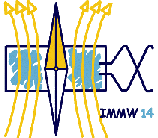Speaker
Prof.
Leopoldo Angrisani
(University of Naples "Federico II")
Description
At CERN, varying magnetic field measurements involve massive use of rotating coils
systems.
Standard procedure for estimating magnetic harmonic coefficients provides for the
fast Fourier transform (FFT) of the magnetic flux, acquired over one complete coil
turn and assumed to be stationary. The assumption certainly holds for magnets
measured along the loadline, i.e. through a powering cycle characterized by several
steps, during each of which a magnetic flux measurement is carried out. For magnets
measured during a LHC cycle, in which the supply current ramps up at 10 A/s, only
the mean value of harmonic coefficients over each coil turn is provided by the
standard procedure. No possibility of tracking the instantaneous value of the
coefficients is given.
In this talk, tests concerning the application of the standard procedure to
simulated magnetic fluxes expected to be measured in the presence of different
current laws and variation rates are presented. In each simulated condition,
difference between estimated and nominal mean value, assumed as reference, of
harmonic coefficients is given. The results clearly highlight the need for new
measurement approaches.
Two new digital signal processing approaches are proposed. The first one applies,
in a combined way, quadrature detection and short time Fourier transform (STFT) to
the acquired magnetic flux samples. The second approach extrapolates magnetic flux
samples outside those covering three complete coil turns, thus giving the
possibility of reconstructing the magnetic flux over a complete coil turn at a
given time instant. The performance of both approaches is assessed and compared.
Authors
Mr
Alessandro Masi
(CERN)
Prof.
Leopoldo Angrisani
(University of Naples "Federico II")
Co-authors
Dr
Luca Bottura
(CERN)
Dr
Rosario Schiano Lo Moriello
(University of Naples "Federico II")
